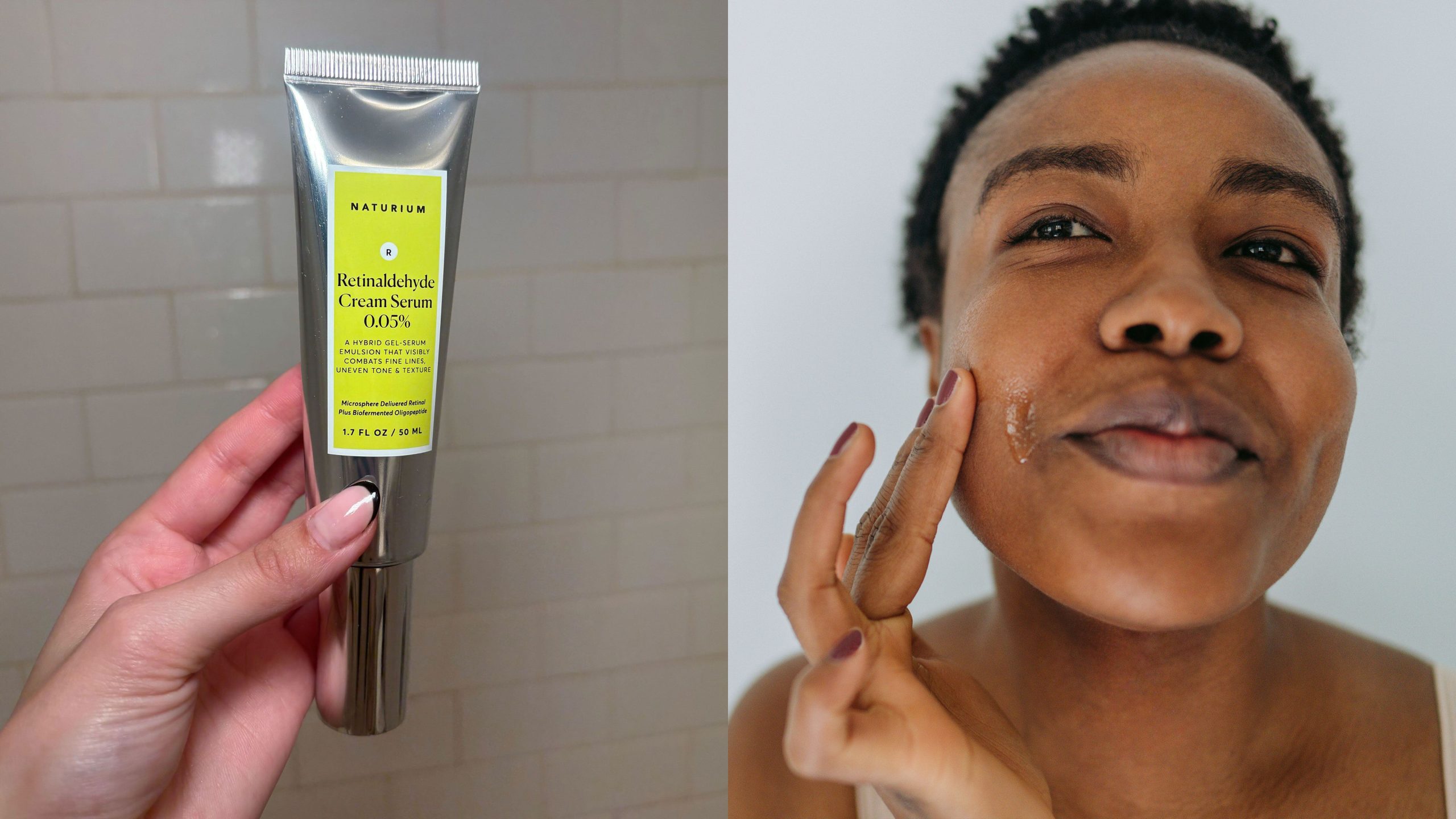
9 Best Retinols for Sensitive Skin, According to Dermatologists
All products featured on Glamour are independently selected by our editors. However, we may receive compensation from retailers and/or from purchases of products through these links.
Finding the best retinols for sensitive skin may sound challenging, considering the ingredient’s reputation for causing flaking, itchiness, and redness. But low concentrations and nourishing ingredients in some serums can help those with easily-irritated complexions enjoy the benefits without experiencing those dreaded side effects. We spoke with board-certified dermatologists about their favorite sensitive-skin-friendly retinol serums and creams for smoothing, brightening, and firming. Our top overall pick is The Ordinary Retinol 0.5% in Squalane, because it’s affordable, gentle, and hydrates and soothes while gently promoting cell turnover. But we also found drugstore options, and ones for conditions like eczema, rosacea, or cystic acne.
The best retinols for sensitive skin, at a glanceBest Overall
The Ordinary Retinol 0.5% in Squalane
Jump to review
Best Drugstore
CeraVe Resurfacing Retinol Serum
Jump to review
Best for Mature Skin
Olay Regenerist Retinol 24 Night Moisturizer
Jump to review
Best for Oily Skin
Paula’s Choice Clinical 0.3% Retinol + 2% Bakuchiol Treatment
Jump to review
Best for Dry Skin
Eau Thermale Avène RetrinAL 0.05
Jump to review
We tested retinols for sensitive skin by taking a look at the formula’s concentration—particularly between 0.3% to 1%—the texture, and overall efficacy. The ones that made the list had a gentle and nonirritating application, absorbed quickly, leaving no residue or stickiness behind. All of them also contained extra-hydrating ingredients like hyaluronic acid, ceramides, squalane, and more to soothe and reduce redness and flakiness. Most importantly, they were effective at smoothing fine lines and texture over time.
Best Overall: The Ordinary Retinol 0.5% in SqualaneThe Ordinary Retinol 0.5% in Squalane
Original video from Alanna Martine Kilkeary testing The Ordinary Retinol 0.5% in Squalane
Pros: Lightweight; leaves skin feeling very moisturized; non-strippingCons: Smells weird; takes a minute to fully absorbThis antiaging formula is a favorite among Glamour editors and dermatologists alike, because it’s gentle with only a 0.5% concentration supported with squalane. Why is this important? “A retinoid paired with a moisturizing base with barrier-supportive ingredients, such as ceramides and squalane, will always feel gentler than one in a drying gel base,” says Aegean H. Chan, MD, FAAD, a dual board-certified dermatologist based in California. The anti-inflammatory ingredient helps keep skin smooth and irritation-free.
Tester notes: “I’ve struggled with a lot of uneven skin texture due to acne scars from former breakouts,” says Glamour commerce writer Alanna Martine Kilkeary. “So, I’m always looking for a retinol to help smooth and even out my skin tone in these areas. I was impressed with this serum upon first trying it: it’s lightweight and leaves skin feeling hydrated and non-stripped. After using it for a few weeks, I’ve noticed an improvement in my acne scars around my nose and on my chin—the area looks more clarified and smooth. The only thing I didn’t love about this serum was the smell, but that’s easy to overlook after seeing some pretty great results for only $9.”
Best Drugstore: CeraVe Resurfacing Retinol SerumCeraVe Resurfacing Retinol Serum
Original video from Jenifer Calle testing CeraVe Resurfacing Retinol Serum
Pros: Encapsulated formulation; acne-friendly; brightening benefits thanks to licorice-root extractCons: No concentration listedEach retinol particle in CeraVe’s Resurfacing Retinol Serum is surrounded by a buffering ingredient to ensure its gentleness and reduce irritation, says Jenny Liu, MD, a board-certified dermatologist and assistant professor of dermatology at the University of Minnesota. Hydrating ceramides and licorice-root extract, a natural skin brightener that helps the encapsulated retinol serum lock in moisture while fading hyperpigmentation and diminishing dullness. Our testers love how this acne-friendly gel has a barely-there feel that swiftly sinks into skin.
Testing notes: This was the first retinol product Jenifer Calle, Glamour’s senior commerce editor, used on her oily, combination skin. “It feels so lightweight and doesn’t cause any redness or irritation. I’ve gone through two bottles and would recommend it for retinol beginners.”
Best for Mature Skin: Olay Regenerist Retinol 24 Night MoisturizerOlay Regenerist Retinol 24 Night Moisturizer
Original video from Charlotte Twine testing Olay Regenerist Retinol 24 Night Moisturizer
Tsippora Shainhouse, MD, a board-certified dermatologist in Los Angeles, previously told Glamour that Olay Regenerist Retinol 24 Night Moisturizer is her favorite retinol cream. Dr. Liu also endorses the water-based night cream for sensitive and mature skin types too.
Testing notes: “This night cream has earned a place on my nightstand right off the bat—and I’m picky. Yes, I can feel a tingling sensation, but it’s not severe. I was surprised at how quickly it absorbed—like, lickety-split—unusual for a night cream. And the best part is, after the first night of using it, I woke up the next morning with my skin feeling smoother and plump, an ideal surface for putting on makeup. Over a few days of use, the discoloration and lines on my face are a bit less prominent, since the brightness of my complexion is taking center stage,” says Glamour copy manager Charlotte Twine.
Best for Oily Skin: Paula’s Choice Clinical 0.3% Retinol + 2% Bakuchiol TreatmentPaula’s Choice Clinical 0.3% Retinol + 2% Bakuchiol Treatment
Original video by Glamour senior commerce editor Jenifer Calle using Paula’s Choice Clinical 0.3% Retinol + 2% Bakuchiol Treatment
Pros: Minimizes appearance of large pores; helps control oiliness; lightweight; absorbs quicklyCons: Smells a little funny; it’s easy to use too much product, so be sparing and gentleIf you have oily skin that’s riddled with large pores or acne scars, this retinol and bakuchiol hybrid formula will help smooth texture and unevenness. The addition of firming peptides means it’s also suitable for mature skin.
Testing notes: “I’ve only been testing for a month, but I’ve noticed overall smoothness on my skin. I’m in my 30s, so I like having a retinol product in my skin care routine for my eleven lines. It’s very gentle and absorbs very quickly when applying. I haven’t experienced any redness or irritation, but it does have a slightly off-putting scent to it,” says Glamour’s Calle.
Best for Dry Skin: Avène Retrinal 0.1 Intensive Multi-Corrective CreamEau Thermale Avène RetrinAL 0.05
Original video from Norell Zable testing Avène Retrinal 0.1% Intensive Multi-Corrective Cream
Pros: Recommended by dermatologists; has a soothing finishCons: Contains mineral oil. which is not great for acne-prone skinAvène Retrinal 0.05 Cream comes highly recommended for sensitive skin by several derms. The deeply moisturizing, fragrance-free formula features a gentle form of vitamin A called retinal (a.k.a. retinaldehyde). “Retinal is more tolerable for those with sensitive skin,” says Hee Jin Koh, MD, a board-certified dermatologist at Hudson Dermatology and Laser Surgery in New York City. Plus, it’s combined with Avène’s signature thermal spring water and peptides to maximize the serum’s ability to minimize the appearance of fine lines and ensure it’s as non-irritating as possible.
Testing notes: “Avène Retrinal is a great introduction to using retinol without irritation or peeling. My skin felt instantly hydrated and appeared visibly brighter right after I applied it for the first time, as you can even see in my application video. Other retinol products have caused peeling for me in the morning or days after use, but this low-dose alternative seems to be the perfect mix for treatment of fine lines without the drying effects. You don’t need to mix with another lotion, which could dilute the product benefits,” says Norell Zable, executive director of global creative strategy at Condé Nast.
Best for Skin Texture: Naturium Retinaldehyde Cream Serum 0.05%Naturium Retinaldehyde Cream Serum 0.05%
Original video from Alanna Martine Kilkeary testing Naturium Retinaldehyde Cream Serum 0.05%
Pros: Nongreasy; pH balanced, so its gentle on the skin barrierCons: Some customer reviews say it tingles with the first couple of uses and can cause slight drynessRecommended by Dr. Liu and Dr. Koh, the Naturium Retinaldehyde Cream Serum has a pH level of 6 to 7 to match the natural pH of skin, so it’s less likely to damage your skin barrier and cause inflammation. Dr. Koh loves how it also contains bio-fermented oligopeptide, which is a combination of yeast extract and soy amino acids that provide gentle exfoliation properties.
Testing notes: “This serum has a liquid-y gel texture that absorbs into skin almost instantly without feeling sticky or tight, and layers perfectly under a rich moisturizer,” says Glamour contributor Devon Abelman. “I wake up with glassier skin every time I use it,” she says.
Best for Acne-Prone Skin: Glow Recipe Blackberry Retinol Blemish SerumGlow Recipe Blackberry Retinol Blemish Serum
Original video by Glamour beauty contributor Denise Primbet
Pros: Helps reduce inflammation and the appearance of acne scars and marksCons: Has fragrance, which might be irritating to someAcne can leave behind discoloration, pockmarks, and uneven skin texture that can be stubborn to correct. Incorporating a gentle retinol into your routine, even if you have active breakouts, can help with this. This formula combines retinyl ester, retinol, and retinal to gently clarify blemishes and pimples, and leave skin looking soft, plump, and smooth.
Testing notes: “What I love most about this product is how quickly it absorbs into the skin without forming that overly greasy layer. Unlike most retinoid formulas I’ve tried, the Blackberry Retinol Blemish Serum doesn’t result in any irritation whatsoever. If anything, my skin ended up looking more soothed and hydrated,” says Glamour contributor Denise Primbet.
Best K-Beauty: Iope Retinol Super Bounce SerumIOPE Retinol Super Bounce Serum
Original video from Sarah Y. Wu testing Iope Retinol Super Bounce Serum
Pros: Moisturizing; doesn’t sting; works fastCons: Fermented ingredients can be sensitizing for some people’s skinFor decades, Korean skin care products were rarely formulated with retinol because most focus on intensely hydrating and calming skin. However, Korean retinol products are becoming more abundant now, and one in particular has become highly sought after in Seoul: Iope’s Retinol Super Bounce Serum. This gentle formula is moisturizing with the addition of squalane, shea butter, and sunflower-seed oil.
Testing notes: “I’m now almost done with my third bottle of this serum, which is gentle enough for me to use every night. In the past I’ve had to buffer retinols by layering them over moisturizer so I don’t start flaking, peeling, and turning red. Not only does this serum stay gentle, it also makes my skin look smoother, plumper, and more even with continued use,” says Glamour contributor Sarah Y. Wu.
Best for Undereyes: Beauty of Joseon Revive Eye Serum Ginseng + RetinalBeauty of Joseon Revive Eye Serum Ginseng + Retinal
Original video by Glamour beauty contributor Denise Primbet
Pros: Helps wake up and rejuvenate the skin; fades undereye lines without being harshCons: Extremely gentle, so it might take weeks to see resultsRetinol can also improve the appearance of dark circles and undereye bags. This gentle serum has a 0.02% retinol concentration, plus ginseng-root extract and niacinamide to gently de-puff, brighten, and smooth undereye lines and discoloration in the area.
Testing notes: “My skin and eyes are both super sensitive, so I’m always cautious when trying new skin care; however, I’m glad to report that this formula didn’t result in any irritation whatsoever,” says Primbet. “After using this formula for five weeks, I saw evident results and noticed that most of my fine lines were a lot less obvious. The skin around my eyes also started to look more plump, visibly healthier, and less puffy in the morning.”
Frequently asked questions
Retinol is one of the most well-studied skin care ingredients for combating signs of aging and improving overall skin wellness. Retinoids—the collective name for vitamin A derivatives, such as retinol—stimulate collagen production and speed up skin cell turnover, says Kunal Malik, MD, a board-certified dermatologist and assistant clinical professor of dermatology at the Icahn School of Medicine at Mount Sinai in New York City. As a result, they reduce the appearance of fine lines, wrinkles, and pigmentation issues, like sun damage, dark spots, and melasma. The likes of tretinoin (a.k.a. Retin-A), retinal, retinyl palmitate, retinaldehyde, and adapalene can also help banish blemishes, brighten skin, and even skin texture.
What percentage of retinol is good for sensitive skin?
“A common misconception is that if you have sensitive skin, you can’t try retinol,” says Claire Wollinsky, MD, a board-certified dermatologist based in New York City. The truth is, as long as you’re using a gentle formulation suitable for sensitive skin types, you can use the ingredient.
As far as percentage goes, Dr. Malik suggests starting with the lowest possible concentration that is still effective, which is around 0.25% to 0.3%. Once your skin builds up tolerance, you can work your way up to 0.5%. Pairing your retinol with a rich face moisturizer is also a major key to minimizing irritation, Dr. Malik adds.
What form of retinol is best for sensitive skin?
“If you have sensitive skin, not all retinoids are created equal. The least irritating forms are typically the ones that need to go through a few conversion steps before becoming active in the skin, like retinyl palmitate,” says Dr. Chan.
Retinyl palmitate is the most gentle retinol for sensitive skin, as it is the weakest vitamin-A derivative, Dr. Malik says. “It is less potent than retinol but effective over time,” he explains. “Products with encapsulated retinol or time-released technology can also reduce irritation by delivering retinol slowly to skin over time.”
Another great option for sensitive skin is retinaldehyde, says Dr. Chan. “It’s one step closer to active retinoic acid, so it’s more potent than retinol but still very well tolerated because it’s formulated in nourishing, lipid-rich bases. It’s a nice middle ground for people who want results but can’t tolerate stronger prescription retinoids,” she says.
How to use retinol for sensitive skin
Begin incorporating your retinol product into your nighttime skin care routine only one to two times a week and gradually increase frequency, Dr. Malik says. “Always apply a pea-size amount to the entire face on dry skin to reduce irritation, and follow up with a hydrating moisturizer,” he adds. Alternatively, you can try the retinol sandwich method: putting on moisturizer before retinol. Then, add another layer of moisturizer on top of it. Also, be sure to avoid applying any face exfoliants at the same time as retinol to avoid inflammation, and instead opt for gentle cleansers.
Can you use retinol everyday if you have sensitive skin?
“It’s important to start using retinol every other night, and increase to nightly only if tolerated,” says Dr. Wollinsky. Dr. Chan echoes the sentiment: “Daily use isn’t the goal for everyone; it’s about finding the rhythm that your skin is happiest with. Even applying it every two to three nights can give you great results over time,” she says. It is important to make sure to apply facial sunscreen during the day because retinol can increase sun sensitivity.
Are there other ingredients that you can use as alternatives to retinol if you have sensitive skin?
There are a lot of other ingredients out there that can mimic the effects of retinol while being gentler on skin. “For sensitive skin, I often recommend gentle exfoliating acids like lactic acid, mandelic acid, or polyhydroxy acids (PHAs). These work on the skin’s surface to boost cell turnover and improve texture, fine lines, and even collagen repair, but they’re much less likely to disrupt your barrier,” says Dr. Chan. She also notes that peptides are another great option because they help signal collagen production and support the skin’s structure. “They’re also easy to layer with moisturizers and barrier-repair products, which makes them ideal for dry or reactive skin types,” she says.
Jenny Liu, MD, a board-certified dermatologist and assistant professor of Dermatology at the University of MinnesotaHee Jin Koh, MD, a board-certified dermatologist at Hudson Dermatology and Laser Surgery in New York CityKunal Malik, MD, a board-certified dermatologist and assistant clinical professor of dermatology at the Icahn School of Medicine at Mount Sinai in New York CityTsippora Shainhouse, MD, a board-certified dermatologist in Los AngelesRachel Westbay, MD, a board-certified dermatologist at Marmur Medical in New York CityClaire Chang, MD, a board-certified dermatologist in New York CityClaire Wollinsky, MD, a board-certified dermatologist based in New York CityAegean H. Chan, MD, FAAD, a dual board-certified dermatologist based in California











